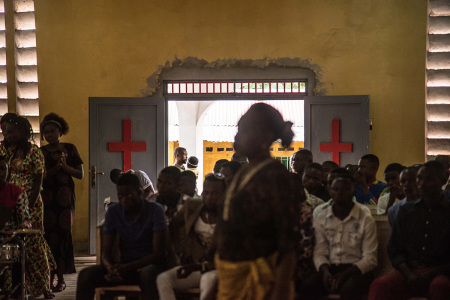NGOs ask Biden admin. to protect Congolese Christians living in the US

A group of nongovernmental organizations has urged the U.S. Department of Homeland Security to allow Congolese citizens to remain in the United States with a work permit as they face the possibility of severe persecution by Islamic extremist groups in their home country.
The groups have written to U.S. Department of Homeland Security Secretary Alejandro Mayokas, asking him to consider granting Temporary Protected Status to citizens of the Democratic Republic of the Congo, the U.S.-based group International Christian Concern announced Saturday.
The TPS mechanism applies to foreign nationals from more than a dozen countries based on unsafe conditions if they were to return to the country. Current countries granted TPS status include Afghanistan, Cameroon, El Salvador, Haiti, Honduras, Nicaragua, Somalia, South Sudan, Sudan, Syria, Ukraine, Venezuela and Yemen.
However, ICC warns that Christians in the eastern DRC are suffering persecution at the hands of extremist groups like the Allied Democratic Forces, an Islamic extremist group mainly active in the eastern North Kivu province near the border with Uganda.
"Though the Congolese government is pushing back against these terrorist groups, insufficient attention is paid to Christian communities, which are targeted for their differing religious beliefs," ICC stated in a press release.
"ICC has witnessed the violence in the DRC firsthand, in one instance coming across the still-smoking wreckage of a car attacked by terrorists in June of this year. Just days later, at least 10 Christians were killed when an Islamist extremist group ambushed their three vehicles near the village of Makisabo, Beni. The Allied Democratic Forces, an Islamist extremist group, allegedly blocked the road, shot all the passengers, and set the vehicles on fire."
ICC noted that U.S. Secretary of State Antony Blinken called religious freedom "a vital foreign policy priority" at an event in June. Blinken visited DRC in August to participate in meetings to discuss, among other things, human rights issues in the country.
Persecution in DRC mostly takes the form of violent attacks, according to the global persecution watchdog group Open Doors USA.
"In one district in eastern DRC, there are only four remaining Evangelical churches from 24 that were once active," Open Doors notes.
The ADF, a militia formed by Rwandan, Ugandan, Burundian and Congolese dissidents, began operating in the DRC during the 1990s and killed about 1,300 people between January 2021 and January 2022, according to a United Nations report.
In June, the militia group killed at least 18 civilians and burned down many houses in Otomabere village in Ituri province's Irumu area.
In January 2021, more than 100 people were killed in three large attacks in the same province by the ADF, Open Doors reported. About 46 people belonging to the Pygmy ethnic group were killed in Ituri province by suspected militants.
In early January 2021, about 22 civilians were killed by militants wielding guns and machetes in an overnight attack on Mwenda village in the Beni region of neighboring North Kivu province.
In 2020, the U.N. reported that "widespread, systematic and extremely brutal" human rights abuses by the Islamic militant group "could constitute, by their nature and scope, crimes against humanity and war crimes."
While the militant group has not formally linked itself with the Islamic State terrorist group, IS has claimed responsibility for some of their attacks, calling Congo the "Central Africa Province" of the "caliphate."





















